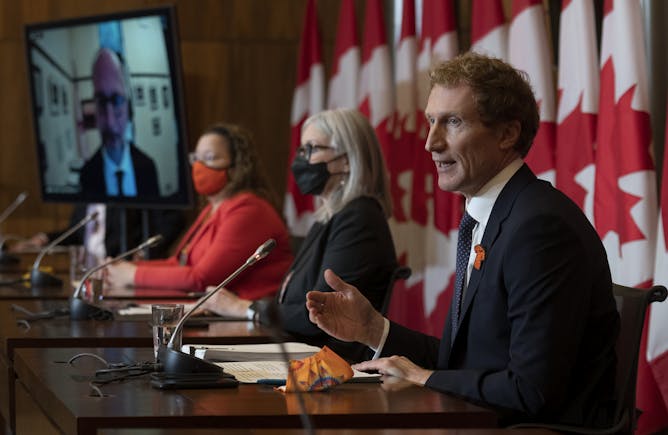|
The government of Canada announced it had reached agreements-in-principle this week to compensate First Nations victims of its discriminatory child welfare system and to fund long-term reform of both the First Nations Child and Family Services and Jordan’s Principle.
The agreements-in-principle were reached following nearly two months of negotiations between the First Nations Child and Family Caring Society, the Assembly of First Nations, the Chiefs of Ontario, the Nishnawbe Aski Nation and counsels for two class action cases — Xavier Moushoom and Zach Trout.
Today in The Conversation Canada, Anne Levesque from the University of Ottawa explains what you need to know about the agreements.
She was one of the lawyers who represented the First Nations Child and Family Caring Society in its human rights case, which led to a historic victory in 2016 before the Canadian Human Rights Tribunal and affirmed the right to equality for more than 165,000 First Nations children. She also assisted the Caring Society’s lawyers with this agreement. Levesque says there’s still work to be done.
Also today:
Nyà:wen (thanks),
|

AFN Regional Chief Cindy Woodhouse and Indigenous Services Minister Patty Hajdu listen to Crown-Indigenous Relations Minister Marc Miller as he responds to a question during a news conference on Jan. 4, 2022, in Ottawa.
THE CANADIAN PRESS/Adrian Wyld
Anne Levesque, L’Université d’Ottawa/University of Ottawa
In the next year, public support will be needed more than ever to ensure that the spirit of the agreement is respected and translated into meaningful change for First Nations children.
|

Popular New Year’s resolutions include exercising, learning a new skill and travelling.
(Shutterstock)
Brad Aeon, Université du Québec à Montréal (UQAM)
New Year’s resolutions can help us aim for a better future, but time management is the real key to actually achieving those resolutions.
|

A key change in abortion care during the pandemic was that many providers offered some or all services via telemedicine.
(Shutterstock)
Kate Wahl, University of British Columbia; Madeleine Ennis, University of British Columbia
Pandemic-related travel restrictions and facility closures initially jeopardized access to abortions, but the pandemic has also become a catalyst for more accessible ways to deliver abortion care.
|

A growing interest in fermented foods may direct people to a Bengali fermented rice dish.
(Shutterstock)
Aditi Sen, Queen's University, Ontario
A rice dish’s debut on a cooking competition show reflects the growing acceptance of ethnic foods.
|

A woman and children who were stranded by high water due to flooding are rescued by a volunteer operating a boat in Abbotsford, B.C., in November 2021. The Insurance Institute of Canada forecasts that annual insured losses from natural disasters could increase to $5 billion within the next 10 years.
THE CANADIAN PRESS/Darryl Dyck
Anne E. Kleffner, University of Calgary; Mary Kelly, Wilfrid Laurier University
Although insurance is important in natural disaster recovery, government and property owners also play an important role in protecting Canadians against the impact of catastrophic weather events.
|

Ryan Rhodes, University of Victoria
Plus de la moitié des personnes qui ont l’intention de modifier leur mode de vie ne le font pas. Des automatismes les empêchent d’adopter et de conserver de nouvelles habitudes de santé.
|
Arts
|
-
Gale Sinatra, University of Southern California; Barbara K. Hofer, Middlebury
Just because something isn’t 100% certain doesn’t mean you ignore it, and other lessons from two researchers who study the problem of science denial.
|
|
Education
|
-
Fatemeh Aminpour, UNSW
Conflicts at recess, averaging one every three minutes, greatly disrupt children’s play activities. However, a well-designed school layout can reduce the problem.
|
|
Politics
|
-
Stephen Reicher, University of St Andrews; Alex Haslam, The University of Queensland; Evangelos Ntontis, The Open University; Klara Jurstakova, Canterbury Christ Church University
What happened on January 6, 2021 was a genuine co-production between Trump and his supporters.
|
|